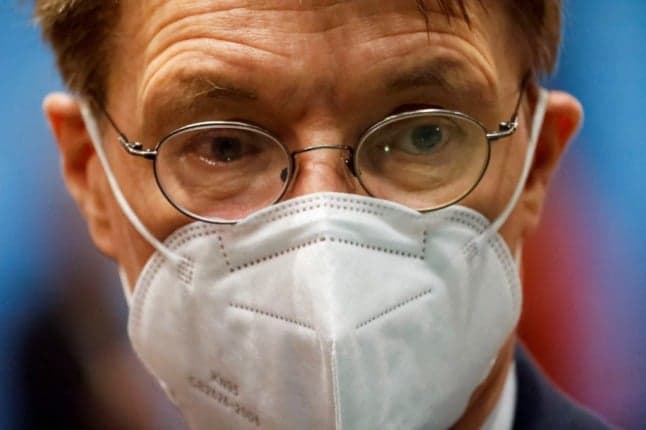German Health Minister warns of 'naive belief Omicron is the end of the pandemic'

German Health Minister Karl Lauterbach warned that it was "naive to believe that Omicron is the end of the pandemic" as he defended the introduction of a general vaccine mandate in the fight against Covid-19 and announced a reform of the country's vaccination system.
Although the disease process of the highly contagious Omicron variant was thought to be milder, an infection with this strain did not necessarily make one immune to the next variant that came along, he told Welt am Sonntag.
The vaccine mandate was therefore particularly important given the high number of people who remain unvaccinated, the SPD minister said.
"We have to accept that even with a vaccine mandate, we will never reach everybody. But I am convinced that there is a large group of unvaccinated people that we could motivate to have a vaccination through the mandate," he said.
The mandate is due to be discussed by the end of January and Chancellor Olaf Scholz hopes to introduce the measure in "late February or early March".
Lauterbach's hope was that society would be relatively well protected thanks to the vaccine mandate.
"We should not get into a situation again where summer is deceptively good, but new variants surprise us in autumn without the vast majority of the population being vaccinated. Because then everything would start all over again," he said.
Germany's vaccination campaign picked up again on Friday after the end of the holiday period with 648,000 jabs administered, according to the Robert Koch Institute (RKI).
At least 42.3 percent of the population has so far received a booster jab, which is thought to be essential in providing effective protection against Omicron.
READ ALSO: KEY POINTS: Germany's plans to soften the impact of Omicron
Vaccine structure reform
Lauterbach also said in the interview that Germany's vaccination strategy would be revamped.
"If we get a variant that is as contagious as Omicron, but significantly more deadly, we should be able to develop and produce a vaccine in a very short time," Lauterbach said.
The government was already preparing for this eventuality to create a system whereby vaccines could be provided at speed at any moment in the event of serious new outbreaks, he said.
The Omicron variant currently represents 44 percent of Covid-19 infections in Germany, according to the RKI.
On Saturday, there were 55,889 new coronavirus infections within 24 hours, more than twice that of the previous week.
Like several other countries, Germany has already announced vaccine mandates for those in certain professions, including soldiers and health workers.
Neighbouring Austria has gone further and is on the verge of introducing a general vaccine mandate, in what could be the first in Europe.
READ ALSO: Austria presents first draft of vaccine mandate law: Here's what we know
Comments (1)
See Also
Although the disease process of the highly contagious Omicron variant was thought to be milder, an infection with this strain did not necessarily make one immune to the next variant that came along, he told Welt am Sonntag.
The vaccine mandate was therefore particularly important given the high number of people who remain unvaccinated, the SPD minister said.
"We have to accept that even with a vaccine mandate, we will never reach everybody. But I am convinced that there is a large group of unvaccinated people that we could motivate to have a vaccination through the mandate," he said.
The mandate is due to be discussed by the end of January and Chancellor Olaf Scholz hopes to introduce the measure in "late February or early March".
Lauterbach's hope was that society would be relatively well protected thanks to the vaccine mandate.
"We should not get into a situation again where summer is deceptively good, but new variants surprise us in autumn without the vast majority of the population being vaccinated. Because then everything would start all over again," he said.
Germany's vaccination campaign picked up again on Friday after the end of the holiday period with 648,000 jabs administered, according to the Robert Koch Institute (RKI).
At least 42.3 percent of the population has so far received a booster jab, which is thought to be essential in providing effective protection against Omicron.
READ ALSO: KEY POINTS: Germany's plans to soften the impact of Omicron
Vaccine structure reform
Lauterbach also said in the interview that Germany's vaccination strategy would be revamped.
"If we get a variant that is as contagious as Omicron, but significantly more deadly, we should be able to develop and produce a vaccine in a very short time," Lauterbach said.
The government was already preparing for this eventuality to create a system whereby vaccines could be provided at speed at any moment in the event of serious new outbreaks, he said.
The Omicron variant currently represents 44 percent of Covid-19 infections in Germany, according to the RKI.
On Saturday, there were 55,889 new coronavirus infections within 24 hours, more than twice that of the previous week.
Like several other countries, Germany has already announced vaccine mandates for those in certain professions, including soldiers and health workers.
Neighbouring Austria has gone further and is on the verge of introducing a general vaccine mandate, in what could be the first in Europe.
READ ALSO: Austria presents first draft of vaccine mandate law: Here's what we know
Join the conversation in our comments section below. Share your own views and experience and if you have a question or suggestion for our journalists then email us at [email protected].
Please keep comments civil, constructive and on topic – and make sure to read our terms of use before getting involved.
Please log in here to leave a comment.